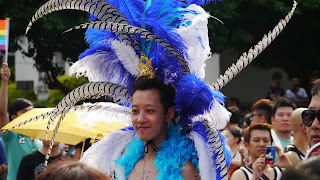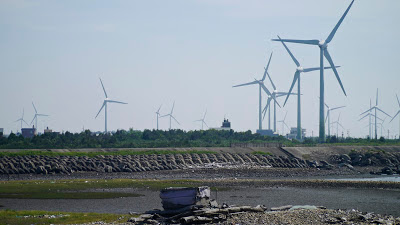Ex-gangster Chang An-le is back in Taiwan and he has political ambitions, a campaign office, and a political tract
Ever since his return to Taiwan in late June, Chang An-le (張安樂), the wanted fugitive and former leader of the Bamboo Union triad, has endeavored to remind everybody in Taiwan that he’s written a booklet promoting the “peaceful re-unification” of Taiwan and China.
Even when a SWAT team picked him up after he exited the airplane from Shanghai, the handcuffed Chang, smiling, succeeded in displaying his political tract, for all to see. And no sooner had he been released on bail the same day than the “White Wolf” (白狼), as he is called in the underworld, started appearing on TV talk shows desperate for ratings, where, besides promoting his political views and showing just out of touch with Taiwan’s political scene he has become after an absence of 17 years, he also made sure to flash the booklet.
 |
| The 48-page booklet |
After seeing “Peaceful Unification and One County” (和平統一、一國兩制) so many times, I decided that I needed to obtain a copy for myself, to see what I could learn about his plans for the future of China and Taiwan, especially now that the party he created while he was exiled in China has indicated its intention to field candidates in next year’s local elections, and perhaps even in the 2016 presidential election. I needed to see what Chang, who served 10 years in jail in the U.S. for drug trafficking, and who played a role in the assassination in 1984 of the journalist Henry Liu in California, had to say about his plans for unification.
Another reason why I wanted to read the literature stemmed from the high likelihood that the CCP’s United Front efforts to solve the Taiwan Problem involve using criminal organizations. With Chang a free man since his return to Taiwan (no date appears to have been set for his trial), and given his closeness with some political figures in China and Taiwan, I’ve been curious to find out if he might not be part of that campaign. Though it is unable to verify his sources, the exiled Chinese writer Yuan Hongbing (袁紅冰) claims in his book
The Taiwan Crisis to have come upon information that confirms a role for organized crime.
Luckily for me, the Unionist Party’s (中華統一促進黨) office is located in my neighborhood, on Minsheng E Rd, section 3. I walked there, not knowing what to expect once I got there, but vividly remembering the assortment of characters that had gathered by the hundreds on that Saturday to celebrate his return to Taiwan.
I reached the nondescript building and scanned the various company signs displayed on thin metal sheeting on the wall of the lobby. Sure enough, the party was still there. Fourth floor. I went up the cramped elevator, various scenarios — some rather violent, albeit grandly newsworthy — playing through my head. After all, it was likely that I was the very first foreigner ever to visit their party headquarters, and based on my previous experiences with pro-unification figures in Taiwan, they tended to have a bit of a xenophobic streak.
A woman passed by me, a strange expression on her face, as I walked towards the closed glass front door, the large yellow-and-blue sign of two hands clasped in the ostensibly warmth of the people on both sides of the Taiwan Strait, telling me that I had reached my destination. I pressed the ringer, not knowing whether there would be anyone there. It was 11:45 in the morning, but then again, the UP isn’t exactly the KMT or the DPP. In fact, a lot of people don’t even know it exists. There was no answer, but being 6’2” tall, I was able to look in through the small top section of the door that hadn’t been smoked. A man, somewhere in his sixties, was seated at a desk at the far corner of the room, speaking on the phone. No lovely receptionist for you at the UP — at least not yet.
I pushed the door, and it opened. After waiting for about a minute, the man concluded his call and came over, greeting me in Mandarin. I replied that I was a journalist and was wondering whether they had copies of the booklet that Mr. Chang had been promoting since his return to Taiwan. “Of course, of course,” he said, ushering me into a conference room on my left, and leaving me there alone as he went back to his desk.
There were two features to the otherwise empty room: a large PRC flag, the red and yellow contrasting sharply with the egg-white walls, and a large collection of photos — hundreds of them — featuring Chang and the various places he’d visited in China, as well as the many people of influence within the CCP that he had brushed elbows with over the years. This was one of those moments when I terribly regretted not bringing my camera; but then again, I’m not sure how the staff would have reacted if I’d showed up with my large Nikon and 300mm lens, let alone if I’d started snapping pictures. You’ll have to take my word for it: while in China, Chang didn’t live the life of a fugitive, and some of the people he met were pretty high up.
My host promptly returned, holding a small stack of said booklets, though the version he had was of the diminutive kind, much smaller than the 8.5 x 11 original Chang had flashed on TV. He then escorted me towards another door at the far end of the conference room, which gave into another room. In there, another man was seated at a desk — larger, of finer wood, therefore more important, I figured — busily sucking on a cigarette. (For the life of me, I cannot remember if there was another person in the room, though I have the vague impression that there might have been a second man). My first instinct was to remind him that under Taipei City regulations, it is illegal to smoke inside commercial buildings, but I thought better of it. The man, short, slightly overweight, stained teeth, in his early fifties, looked more the kind that had given Chang a bad reputation in the 1980s — in other words, more like a gangster — than the political staffer that one expects to encounter in a party headquarters.
He stood up from behind his desk, and I greeted him, again repeating that I was a journalist and was hoping to get some literature. “How many do you want?” he asked. “Uh, two, would that be all right?” “Have five — six,” he said. They gave me five, which the man in his sixties placed in a yellow envelope, for convenience or to hide the contents, I wasn’t sure.
 |
| Cartoons for unification |
They stood there and seemed to be waiting for me to ask them questions. I told them that all I wanted for the time being was a copy of their booklet. They escorted me out, the short man smiling and thanking me profusely, his left hand cupping his right fist and shaking up and down, a symbol of gratitude in this part of the world. “You wouldn’t happen to have an English version?” I asked jokingly. “Sorry, only Chinese. You understand Chinese, right?” “Yes,” I said as I made for the door. We said goodbye, and I left.
They were polite — welcoming, in fact. Interestingly, they never asked me which media organization I worked for, nor did they ask for a business card. Maybe they need good publicity, given the political ambitions of Chang, who now describes himself as a kind of high priest of unification.
I’ve not had time to give the entire 48-page booklet (the last two pages are lined for note-taking) a close read, but judging from what I’ve seen so far, some of it reads as if Chang’s grandson had written it, with one passage stating: “Taiwanese who oppose unification are like an ostrich … When Taiwan and China are reunited, China will be friends with the entire world.”
Chang’s booklet might be borderline silly, but the White
Wolf has plans for Taiwan, plans that might not necessarily reflect what its 23
million people hope for their future. (Pictures 2 and 3 by the author)


































